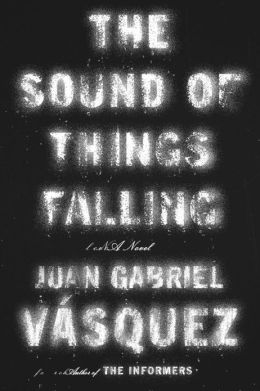Here’s the latest new releases and news in Latino literature for the month of November:
 • Already out: In her book Family Trouble, Joy Castro explores what happens to writers when they reveal their family secrets. Judith Ortiz Cofer and Rigoberto González are included in the book.
• Already out: In her book Family Trouble, Joy Castro explores what happens to writers when they reveal their family secrets. Judith Ortiz Cofer and Rigoberto González are included in the book.
• In the novel The Accidental Native by J.L. Torres, a man comes to Puerto Rico to bury his parents, only to discover he was adopted.
 • Actor/writer/director/producer Rick Najera, whose credits include the screenplay for Nothing Like the Holidays, explores his time in the entertainment industry in Almost White: Forced Confessions of a Latino in Hollywood. He talked about the book to NPR. In another memoir, Illinois Rep. Luis Gutiérrez talks about his life in Still Dreaming: My Journey from the Barrio to Capitol Hill.
• Actor/writer/director/producer Rick Najera, whose credits include the screenplay for Nothing Like the Holidays, explores his time in the entertainment industry in Almost White: Forced Confessions of a Latino in Hollywood. He talked about the book to NPR. In another memoir, Illinois Rep. Luis Gutiérrez talks about his life in Still Dreaming: My Journey from the Barrio to Capitol Hill.
 • Don’t Say a Word, Mama/No Digas Nada, Mama is the latest children’s book from Joe Hayes. The story focuses on two sisters and the garden they make with their mother.
• Don’t Say a Word, Mama/No Digas Nada, Mama is the latest children’s book from Joe Hayes. The story focuses on two sisters and the garden they make with their mother.
• Nov. 5: Chris Pérez remembers his wife in the memoir To Selena, with Love (Commemorative Edition).
• Nov. 12: In The Living by Matt de la Peña, an 18-year-old cruise ship worker finds himself fighting for his life when a huge earthquake and tsunami hits the Pacific Ocean.
 • Nov. 19: In the children’s book Mi Familia Calaca/My Skeleton Family by Cynthia Weil and illustrated by Jesus Canseco Zárate, the artwork of Oaxaca, Mexico is used to illustrate the diversity of family structures. Richard Blanco describes the process of writing the poem for President Obama’s inauguration in the book For All of Us, One Today: An Inaugural Poet’s Journey.
• Nov. 19: In the children’s book Mi Familia Calaca/My Skeleton Family by Cynthia Weil and illustrated by Jesus Canseco Zárate, the artwork of Oaxaca, Mexico is used to illustrate the diversity of family structures. Richard Blanco describes the process of writing the poem for President Obama’s inauguration in the book For All of Us, One Today: An Inaugural Poet’s Journey.
• Dec. 3 – Spaniard Antonio Muñoz Molina depicts life during the Spanish Civil War in the novel In the Night of Time.
 Remembering Oscar Hijuelos: Oscar Hijuelos, the first Latino to win the Pulitzer Prize for Fiction for his 1989 book The Mambo Kings Play Songs of Love, died at age 62 last month. Here is his obituary from The New York Times. His friend Gustavo Perez Firmat remembered him in this NPR interview.
Remembering Oscar Hijuelos: Oscar Hijuelos, the first Latino to win the Pulitzer Prize for Fiction for his 1989 book The Mambo Kings Play Songs of Love, died at age 62 last month. Here is his obituary from The New York Times. His friend Gustavo Perez Firmat remembered him in this NPR interview.
Other features:
 • Daniel Alarcón, left, talked about his new book, At Night We Walk in Circles, to Latino USA, Guernica and Vogue magazines, the LA Review of Books and NPR.
• Daniel Alarcón, left, talked about his new book, At Night We Walk in Circles, to Latino USA, Guernica and Vogue magazines, the LA Review of Books and NPR.
• Sarah Cortez discussed her life as a poet and a police officer to Voice of America.
• Junot Díaz and illustrator Jaime Hernandez spoke to The Washington Post and Complex.com about the making of the deluxe edition of This is How You Lose Her. Huffington Post featured several of the images.
 • Patricia Engel, right, author of It’s Not Love, It’s Just Paris, was profiled by SouthFlorida.com.
• Patricia Engel, right, author of It’s Not Love, It’s Just Paris, was profiled by SouthFlorida.com.
• Reyna Grande talked about her memoir The Distance Between Us in an interview with KPBS.
• NBC Latino featured Tim Z. Hernandez, author of Mañana Means Heaven, and Nicolás Kanellos, the founder of Arté Publico Press.
• Poet Charlie Vázquez announced the introduction of Editorial Trance, which will publish ebooks by Latino writers.
• This is awesome: The Shortlist website compiled “30 Pieces of Wisdom from Gabriel García Márquez Novels.”
• Great story: Public Radio International traveled to Peru and discovered its writers are spreading their stories through Lucha Libro writing.
• Read the writings of 16 emerging Cuban writers compiled by Orlando Luis Pardo Lazo. (Hat tip to The Millions website.)
• Here is coverage from the Latino Information Network at Rutgers of the Las Comadres and Compadres Writers Conference writers’ workshop that took place in October in Brooklyn. The School Library Journal also reported on the event.
• The Scholastic Book Box Daily Blog featured a great profile on Pura Belpré, the New York Public Library’s first Latina librarian and the woman whose name appears on the American Library Association awards for young readers’ literature aimed at Hispanics. The Pura Belpré Awards will be announced in January.
• Latinas for Latino Lit has a great package for families with young children — reading kits featuring a book (on Belpré, Cesar Chavez and Dolores Huerta and Celia Cruz), along with a booklet and pencils.
• In an article for The Texas Observer, San Antonio writer Gregg Barrios discussed the lack of Latino writers at the Texas Book Festival that took place last month. Officials from the organization responded by saying they were late with the invites and some authors declined to attend.
• Seven books that were banned by the Tucson school district — including Occupied America by Rudolfo K. Acuña, can now be read by students in the classroom, reports the Huffington Post.
• Publishing Perspectives took a look at the children’s book market in Brazil.
 Shy, the main character in Matt de la Peña’s The Living (Delacorte), is not having a good week.
Shy, the main character in Matt de la Peña’s The Living (Delacorte), is not having a good week. More about Matt de la Peña: de la Peña is the author of four other novels, including Mexican White Boy, Ball Don’t Lie (which was made into a 2008 movie), We Were Here and I Will Save You. He lives in Brooklyn, N.Y.
More about Matt de la Peña: de la Peña is the author of four other novels, including Mexican White Boy, Ball Don’t Lie (which was made into a 2008 movie), We Were Here and I Will Save You. He lives in Brooklyn, N.Y.


































